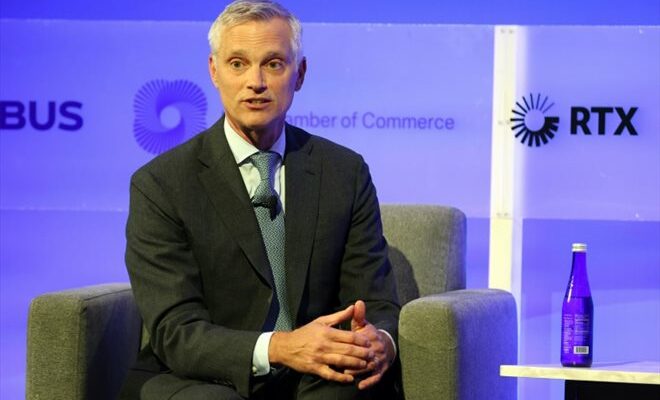An Airbus A320 from JetBlue, a Boeing 737 from Southwest Airlines, and an Airbus A319 from American Airlines at LaGuardia Airport in New York, January 9, 2024 (AFP/Charly TRIBALLEAU)
Airlines have little alternative to the Airbus-Boeing duopoly, in a position of strength despite delivery delays and production defects, as their order books are saturated and their suppliers are struggling to supply them.
For several months, the American manufacturer has been facing problems in the 737 MAX family, its flagship plane, which culminated in an in-flight incident at the beginning of January on an Alaska Airlines plane.
Its production rate, which was to accelerate until 2025, suffered a sudden slowdown with the freeze imposed by the American civil aviation regulatory agency (FAA) for the 737 MAX at the current level.
Deliveries, already delayed in 2023, will slow down further.
Its European competitor Airbus, less in the spotlight, is suffering the consequences of a problem with its supplier Pratt & Whitney.
Hundreds of engines powering the A320neo must be inspected until 2026 because of a contaminated component used for high-pressure turbine disks.
The schedules of many companies are disrupted because each plane must remain on the ground for an average of between 250 and 300 days.
Some are stalling because air transport is experiencing a strong rebound in demand. Some made more or less hidden innuendoes in January, especially aimed at Boeing.
This is particularly the case of Ben Minicucci, boss of Alaska Airlines which sources its supplies exclusively from Boeing. But the company is in the process of buying Hawaiian Airlines, equipped with Airbus.
“This gives us options,” noted Mr. Minicucci, who is also reviewing his plan to buy 737 MAX 10s.
– Shopping –
Asked about the future of its commercial relationship with Boeing, the boss of American Airlines explained that he considers “reliability and safety, immediately, as soon as it leaves the factory” “very seriously”.

Robert Isom, CEO of American Airlines, on September 12, 2023 in Washington (GETTY IMAGES NORTH AMERICA/AFP/Archives/Kevin Dietsch)
“I will say no more,” concluded Robert Isom, cryptically, after citing Boeing, and its competitors Airbus and Embraer.
But changing plane suppliers isn’t as simple as changing car brands.
We need space in the order book, suppliers capable of keeping pace and then training all maintenance and flight personnel in the new work tool.
Airbus is fully booked until 2030 for single-aisle aircraft (A320 family) and until 2028 for long-haul aircraft (A350).
“We have to deliver 8,600 aircraft on time and with quality. So the question is not whether increasing the rate is necessary or not,” explained Christian Scherer, general director of Airbus Commercial Aircraft, recently.
The aircraft manufacturer wants to increase to 75 A320s per month in 2026, compared to 48 in 2023. The long waiting times “do not prevent us from taking a lot of orders”, he rejoiced.
Airbus has never had so many in its history: 2,094 net orders in 2023, a record since 2013.
The European group is taking advantage of the fact that airlines must modernize their fleets to meet the sector’s goal of being emissions neutral in 2050, by which time global air traffic is expected to have doubled.
– Troubles –
And the fact that, on the other side of the Atlantic, its main competitor is going through a bad patch.
In addition to its quality concerns, Boeing is still awaiting certification of the MAX 7 – the little one in the 737 family – and the MAX 10 – the big brother.
However, Boeing received 391 gross orders for the MAX 7 and 1,180 for the MAX 10, deliveries of which were to begin in 2023.
Faced with uncertainty, several companies have just removed them from their schedules for 2024 (United, Southwest).
Like Airbus, its order book is clogged until the end of the decade. At the end of December, it included more than 4,000 examples of the 737, out of a total of 5,626 aircraft.
Even if the two manufacturers had short-term slots, they would still face supply problems which have penalized their production rates since the pandemic.
The supply chain “is simply not able to sustain an increased level of production, let alone the lack of materials” such as titanium and metals mined from Russia and Ukraine, notes Christopher Raite of Third Bridge.
Subcontractors “do not have the capacity to supply a monthly production rate of more than sixty Airbuses and more than fifty Boeings”, he adds, also referring to recruitment problems since the pandemic.
In these circumstances, what recourse can be had for companies that do not receive their planes and cannot purchase them elsewhere?
“Rental,” answers Michel Merluzeau, from the specialist firm AIR.
Two major players in this sector, based in Ireland and customers of the two manufacturers: AerCap, world number one which rents planes to more than 300 companies, and SMBC.
Michael O’Leary, boss of Ryanair, has found another avenue: he wants to recover the MAX 10s from companies that no longer want them.
© 2024 AFP
Did you like this article ? Share it with your friends using the buttons below.




